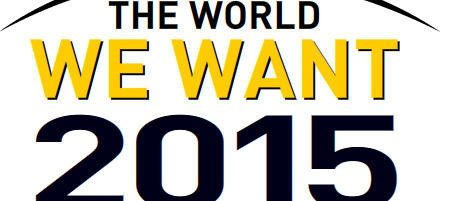
We would like to recall that online consultations are still opened on thematics of high interest for local and regional governments, especially on inequalities, governance, environmental sustainability and population dynamics.
On Inequalities:
To ensure that inequalities are addressed in the post-2015 agenda, the Global Thematic Consultation on Addressing Inequalities (co-led by UNICEF and UN Women, and sponsored by the Government of Denmark and Ghana) is holding a series of online, moderated discussions to gather views from a broad range of stakeholders on what the post-2015 development agenda should look like. The following discussions are currently taking place:
• UNICEF and the disability rights advocacy network International Disability Alliance (IDA) are co-moderating an Online Discussion on Inequalities and Persons with Disabilities in the post-2015 development agenda. The discussion began on 14 November and will continue for three weeks.
• The Secretariat of the United Nations Permanent Forum on Indigenous Issues is co-moderating an Online Discussion on Inequalities and Indigenous Peoples in the post-2015 development agenda. The discussion began on 27 November and will continue for three weeks.
• UNICEF, ILO and Save the Children are co-moderating an Online Discussion on Economic Inequalities in the post-2015 development agenda. The discussion began on 19 November and will continue for three weeks.
On Governance:
The Global Thematic Consultation on Governance and the post-2015 development framework is co-convened by UNDPand the OHCHR, in partnership with the Government of Germany. This is an open and inclusive multi-stakeholder forum aims to contribute to the setting of shared governance priorities in the context of ameliorating poverty and inequality, whilst championing universal rights and values.
The Online Moderated Discussion on Governance and Accountability in the post-2015 development framework will run in two phases over the course of four weeks (19 November 2012 to 14 December 2012)and will ultimately feed into the final multi-stakeholder governance consultation, expected to take place in Johannesburg, South Africa at the end of February 2013.
• Phase I (19 November – 2 December) will reflect on the lessons that have emerged about the role of governance in the achievement and sustainability of the MDGs and other international development goals. The overall guiding question of this phase of the e-Discussion is: What should be the governance building blocks for a post-2015 agenda?
• Phase II (3 December –16 December) will focus on “Ensuring an accountability framework for delivery on the post-2015 development agenda” and will address the question “How can we ensure an accountability framework that takes into account human rights principles and obligations to assure effective delivery on the post-2015 development agenda?”
On Environmental Sustainability:
UNDP and UNEP have launched a post-2015 environmental sustainability global consultation, which aims to bring together a multitude of voices to stimulate creative and innovative thinking on how we can put global development on a more environmentally sustainable path that can lead us to the world we want.
Within this consultation, there is currently a call for discussion papers. Interested individuals or organizations are requested to share topics that they think should be a priority for the dialogue on environmental sustainability in the post-2015 agenda.
Discussion papers should aim to stimulate creative thinking and dialogue around the role environmental sustainability should play within both the broad post-2015 development framework as well as the specific development goals that will be developed to support this. Therefore, participants are encouraged to propose topics that:
• build on MDG7 experiences and lessons and/or
• bring forward new and emerging thinking and experiences related to integrated approaches that link economic, social and environmental sustainability and touch on cross-cutting issues such as gender equality, human rights, young people, inequalities and the partnerships necessary to make progress.
Discussion papers should include the following components:
• Brief outline and rationale for a proposed specific topic for discussion
• Brief presentation of existing findings from completed policy and field research or on-going work that provides an evidence base and conceptual frame for the discussion. Contributors can upload or link to the complete papers and existing think pieces referenced in the discussion paper.
• A proposed set of questions that could frame an online discussion on the topic during Phase 2 of the consultation.
On Population Dynamics:
The Global Thematic Consultation on Population Dynamics in the post-2015 UN development agenda, co-convened by UN-DESA, UNFPA, UN-Habitat and IOM in partnership with the Government of Switzerland, aims to stimulate dialogue, facilitate an exchange of ideas and collect and document the views, experiences and perspectives of key stakeholders vis-à-vis population dynamics. It is an opportunity to contribute to the setting of shared global priorities in the context of ameliorating poverty and inequality, whilst championing universal rights and values.
Currently four discussions are taking place on the following questions:
1) How to ensure a human-rights based and gender-responsive approach to addressing population dynamics?
2) Should we consider expanding targets with respect to individual population issues to include such issues as high fertility, demographic bonus, ageing, urbanization, or migration? What would be the disadvantage of broadening the set of targets?
3) Is it possible to develop a common framework for integrating different population dynamics into the post-2015 development agenda?
4) Why and how should population dynamics be integrated into the post-2015 UN development agenda?
The deadline for submission has been extended to 28 December 2012.
For more information on UCLG involvment in the post-2015 development agenda, please check the dedicated page










